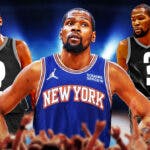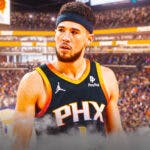It is no secret that the Phoenix Suns have struggled to put together a sufficient supporting cast around Devin Booker. This season was just the latest example of their shortcomings as they will finish the regular season one of the worst records in the NBA.
This season wasn't all negative for the Suns. There was an intriguing seven game stretch in late February and early March when they recorded five wins with two of those victories coming against elite teams like the Golden State Warriors and the Milwaukee Bucks. Those performances featured consistently great play from Booker while he received strong contributions from Kelly Oubre and Deandre Ayton.
It wasn't long until injuries began to derail Phoenix after it appeared that they were finally building momentum as a team. The important thing is that they were able to see what they are capable of accomplishing when Booker receives enough help from his teammates to at least be in a reasonable position to pull off a win.
While that one stretch from the Suns displayed positive signs, only so much stock can be placed in it because it was still just a small component of their season. They have no shortage of needs heading into the offseason. They still need to acquire long-term options to fill the starting point guard and power forward roles and it certainly wouldn't hurt to add depth to their bench.
Here are three ways that the Suns can surround a better supporting cast around Devin Booker:
3. Sign cohesive veterans in free agency
A critical component of achieving sustained results in the NBA is to have a depth chart that has plenty of cohesive veteran talents. Last summer, Phoenix made only two veteran acquisitions by signing Trevor Ariza and Jamal Crawford and that was not nearly enough.
This upcoming summer should be different if it goes according to plan. Suns co-interim general manager James Jones told John Gambadoro of Arizona Sports 98.7 back in February that the team will pursue five free agents that are between the ages of 25 and 30 with the goal of signing at least three of them.
Suns GM James Jones tells @BurnsAndGambo that the organization will target 5 free agents hoping to get 3 and that they are looking for players between the ages of 25 and 30 to add to the young core.
— John Gambadoro (@Gambo987) February 13, 2019
It is unknown if the general manager that the Sun end up hiring will stick to the plan that Jones discussed with Arizona Sports 98.7. There is a chance that the new hire would be strongly encouraged to follow that plan, so keeping it in mind when evaluating their potential options makes sense.
While it is unlikely that Phoenix would be able to attract an All-Star level talent like Kyrie Irving, Kemba Walker, or D'Angelo Russell, there are still plenty of potential options that fit within their desired age threshold. Whether they will be able to attract those talents without having to overpay for them remains to be seen.
The most realistic points guard options that currently fit under the age parameters appear to be Terry Rozier, Ricky Rubio, and Malcolm Brogdon. It is worth noting that Rozier and Brogdon are both restricted free agents, so there is no guarantee that they will be available.
Rozier has struggled this season with averages of just 8.8 points, 3.9 rebounds, and 2.9 assists. Following the return of Kyrie Irving, there just has not been enough opportunity for Rozier. He was last relied on as a key component of their team during their playoff run last season when he averaged 16.5 points, 5.3 rebounds, and 5.7 assists.
It was reported in early March that the Suns had tried to trade for Rozier twice over the last year. The initial attempt was made by former general manager Ryan McDonough before he was fired and Jones tried to trade for him before signing Jamal Crawford. They reportedly offered a protected first-round pick but Boston wouldn't accept the offer.
This season has been a significant struggle for Rubio in the perimeter shooting department and as a scorer, in general, but his passing ability would be a considerable step up. He has still managed to average a solid 12.7 points, 3.6 rebounds, and 6.1 assists for the Utah Jazz this season.
https://www.youtube.com/watch?v=zk1XQYmMdtw
Suns head coach Igor Kokoskov already has a relationship with Rubio from their time on the Jazz together. It wasn't just that they happened be on the same team either. Kokoskov was widely credited for helping Rubio shoot a career-best 35.2 percent from the perimeter last season.
There is a lot to like about Brogdon's skill-set and he projects as being a great fit alongside a playmaker like Booker. This season was cut short for Brogdon after 64 games due to a minor plantar fascia tear in his foot. He ended up averaging an impressive 15.6 points, 4.5 rebounds, and 3.2 assists while posting scoring efficiency that earned him a spot in the '50-40-90 club.'
https://www.youtube.com/watch?v=k7A4A6fJ96k
Phoenix would likely need to be willing to make a significant offer sheet for Brogdon if they truly wanted to sign him. Milwaukee does have to worry about re-signing Khris Middleton, Brook Lopez, and Nikola Mirotic this summer, so perhaps coming in with a big offer for Brogdon could be enough to pull it off.
As far as the power forward position is concerned, there are some intriguing options that are between the ages of 25 and 30. The top unrestricted free agent power forward is Tobias Harris but it appears likely that he will re-sign with the Philadelphia 76ers. However, there still are players like Mirotic or Julius Randle.
Harris put together a near All-Star season mostly with the Los Angeles Clippers before being traded to the 76ers. He is averaging 20.2 points, 7.9 rebounds, and 2.8 assists with tremendous scoring efficiency this season. The main drawbacks are that he is still a defensive liability and the price required to be able to sign him would be likely a max contract.
https://www.youtube.com/watch?v=01bVxe5n_1o
The Clippers did try to come to an agreement on an extension with Harris last summer. He ended up declining a four-year, $80 million offer so the expectation is that he will be seeking significantly more than that during the upcoming summer. Philadelphia has seen great results with on the court so far and that only makes it more enticing for them to pay him.
The power forward option that appears to make the most sense is Mirotic. He ended up averaging an impressive 15.2 points and 7.4 rebounds for both the New Orleans Pelicans and the Bucks this season. He didn't have his most efficient shooting season but he is still a reliable threat from deep at a high volume and seems to be underrated defensively.
https://www.youtube.com/watch?v=0g6OYXWbcBw
There should be no shortage of interested suitors for Mirotic this summer. The teams that tried to acquire him from the Pelicans via trade earlier this year like the Brooklyn Nets, San Antonio Spurs, and the Portland Trail Blazers could end up being the same teams that try to pursue him. Salary cap space could be an issue for Portland, though.
If the main emphasis for the Suns is to bolster their rebounding at the four spot then Randle would be a logical option for them. He has put together a truly impressive season with averages of 21.4 points, 8.7 rebounds, and 3.1 assists all while still shooting 34.4 percent from the perimeter. The offensive fit may not be the cleanest but it would be a significant upgrade nevertheless.
https://www.youtube.com/watch?v=FMlzNJaMEsc
It is hard to predict what the market will be for Randle when he hits free agency this summer and there is a legitimate possibility that he ends staying in New Orleans long-term. The Pelicans looked at potential trade packages involving Randle in February but they ultimately decided to keep him. He could be a needed glimmer of hope during the rebuilding process for them.
Either Marcus Morris or Markieff Morris would be logical power forward options in theory, but neither player left the Suns organization on a positive note. The viability of either of those players ultimately depends on if they view the team differently after moving on from Ryan McDonough.
There are currently too many moving parts to necessarily pin-point specific bench players that make sense for the Suns until they make their draft selections. They have members of their rotation like Kelly Oubre Jr., Richaun Holmes, and Crawford that are set to become free agents this summer as well, so a lot will depend on what they do with those players too.
Jones did mention that they want to add to their core with the three signings that he wants to make, so they wouldn't be end of the bench veterans that don't ever play. That complicates things a bit when mapping out what a potential rotation could look like since they have six current rotation players under contract and will be making another likely top-three draft selection.
2. Experience results in player development
Improving a team doesn't always have to come from making transactions if effective player development takes place. That is especially the case for a team like the Suns that has young talent but has yet to come close to tapping into their maximum potential.
One player in particular that could raise the floor of the team by improving is Josh Jackson and it starts with the offensive end of the floor. Phoenix ended up ranking 25th in the league in scoring efficiency this season while Jackson's scoring efficiency ranked last among the 74 players that recorded at least 1,000 scoring possessions.
Jackson has started off slow during both seasons of his NBA career but has closed them with reasons to believe in him long-term. The recent improvements to his shooting is the main reason to be intrigued by his potential. Since the All-Star break, he has shot on average 1.3-of-3.3 (39.7%) from beyond the arc compared to 0.8-of-2.6 (29.9%) before that period.
22 months after he was drafted, Josh Jackson has gotten rid of the hitch in his shot. Completely different motion compared to last season. pic.twitter.com/1NMYbb26FX
— Evan Sidery (@esidery) April 6, 2019
From an overview standpoint, the Suns need legitimately all of their perimeter players to improve their jump shooting efficiency at the very least and it goes beyond Jackson. They ended up shooting a league-worst 32.9% from beyond the arc this season and the only players that are still on their team that managed to shoot even at least 35% from deep were T.J. Warren (42.8%) and Troy Daniels (38.5%).
Sometimes it's difficult to predict the growth that a player could make over an offseason. A strong example is the boost in Warren's perimeter shooting ability. He went from shooting on average 0.3-of-1.4 (22.2%) from deep in 2017-18 to 1.8-of-4.2 (42.8%) this season. While that level of improvement is unrealistic to expect, it still serves as a reason for optimism.
Phoenix ended up relying on Jamal Crawford as their second most frequently utilized pick-and-roll ball handler and isolation scorer and the results were not close to being sufficient. Receiving progress in the development of their young perimeter prospects with perhaps the exception of Oubre in the playmaking department would make their attack more versatile and be less reliant on Crawford if he were to return.
The defensive end of the floor was a disaster for the Suns this season as their defensive rating (114.2) was better than only the Cleveland Cavaliers. There were silver linings, though. Bridges showed that he could become an All-Defensive Team caliber of perimeter defense but aside from him and De'Anthony Melton, every perimeter player on the roster needs to get better.
The single greatest factor on the Suns' roster that could influence their defensive results is the potential growth that Ayton could make on that end of the floor. The expectation was set that he would be a bad defender early in his career and that proved to be true early in the season. However, he showed improvement as the season progressed.
When listing all of the ways that Phoenix needs their prospects to improve as players, there are ample reminders of their youth as a team. The age of social media may expect instant results and the constant losing has made fans impatient, but effective player development truly takes time.
1. Use their first round pick to acquire a difference maker
The last few seasons have shown that landing a top five pick in the NBA Draft is not always going to translate into an immediate turnaround of a franchise. However, there will come a time when the Suns have compiled enough talented young players that pan out and if their first-round pick from this season is used to acquire a difference making talent.
The top difference maker that comes to mind when thinking about his year's draft class is Zion Williamson. The freshman season that Williamson put together for the Duke Blue Devils was truly impressive with averages of 22.6 points, 8.9 rebounds, 2.1 assists, 2.1 steals, and 1.8 blocks. His play was more than enough for him to be named the AP Player of the Year.
If the Suns land the first pick in the draft lottery then they should just announce Williams as their pick on the spot. His output of 1.246 points per possession during the regular season made him the most efficient offensive player among all players from a Power Five conference this season. He also received an ‘excellent' efficiency grade in every single play type aside from spot-up.
There still are viable options if Phoenix fails to land the top overall selection in the upcoming draft. They could choose to address their need for a point guard by choosing Ja Morant from Murray State. While he may not be as polarizing of a prospect as Williamson, selecting a dynamic perimeter prospect at a mostly aging position would still certainly be beneficial.
The production that Morant gave the Racers this season was truly remarkable. He ended the regular season with lofty averages of 24.5 points, 5.7 rebounds, 10.0 assists, and 1.8 steals. His dynamic skill-set was put on full display during the NCAA Tournament when he produced 17 points, 11 rebounds, and 16 assists against Marquette.
The next best option for Phoenix appears to be trading their first-round pick if they are unable to select either Williamson or Morant. What truly matters is that the asset is being used to land a difference making talent that fits with the timeline of their core, whether it's by actually making a selection or by trading it.
The trade options that the Suns could take will likely depend the philosophy of whoever they hire as their next general manager. They are reportedly ‘focused' on the candidacy of former New Orleans Hornets and Detroit Pistons general manager Jeff Bower and he helped to execute the Blake Griffin trade.
As long as Phoenix avoids a steady slide in the NBA Draft order after the lottery, they should have no shortage of intriguing options to take with their first-round pick. They could eventually form an impressive team if they can remain patient with their approach to player development and get aggressive with roster construction efforts.




